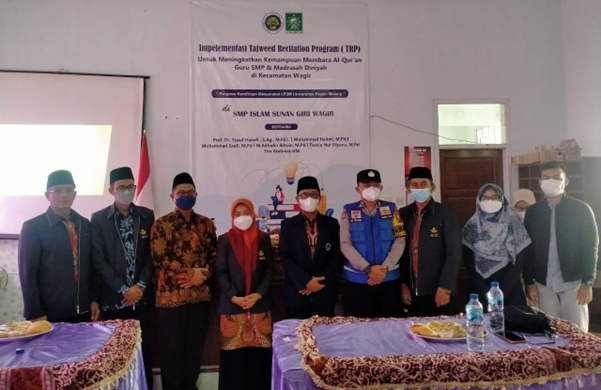Madrasah diniyah teachers' perceptions on the tajwid recitation program's implementation: A post-training qualitative study
DOI:
https://doi.org/10.22219/jcse.v4i3.29202Keywords:
Madrasah Diniyah, Teacher, recitation, tajwid, perceptionAbstract
Formative assessment is often neglected in learning. This study investigates the perception of madrasah diniyah teachers on the planned implementation of the recitation program as part of a formative evaluation in the form of feedback. Twenty madrasah diniyah teachers were asked to respond to a questionnaire that covered three aspects, namely planning, learning outcomes, and teacher support in the post-training. The findings show that teachers have an open view of the implementation of recitation and believe that it can provide significant benefits for student learning outcomes. This paper provides empirical insight into teacher perceptions and provides suggestions for expanding teacher understanding and competence in utilizing recitation programs as an integral element of recitation learning methods and evaluations.
Downloads
References
Ajjawi, R., & Boud, D. (2017). Researching feedback dialogue: An interactional analysis approach. Assessment & Evaluation in Higher Education, 42(2), 252–265. https://doi.org/10.1080/02602938.2015.1102863
Black, P., Harrison, C., Lee, C., Marshall, B., & William, D. (2003). Assessment for Learning- putting it into practice. Open university Press. http://www.mcgraw-hill.co.uk/html/0335212972.html
Boud, D., & Molloy, E. (2013). Rethinking models of feedback for learning: The challenge of design. Assessment & Evaluation in Higher Education, 38(6), 698–712. https://doi.org/10.1080/02602938.2012.691462
Carless, D., Salter, D., Yang, M., & Lam, J. (2011). Developing sustainable feedback practices. Studies in Higher Education, 36(4), 395–407. https://doi.org/10.1080/03075071003642449
Creswell, J. W. (2014). Research Design: Qualitative, Quantitative and Mixed Methods Approaches (4th edition). SAGE Publications, Inc.
Docktor, J. L., & Mestre, J. P. (2014). Synthesis of Discipline-Based Education Research in Physics. Physical Review Special Topics - Physics Education Research, 10(2). https://doi.org/10.1103/PhysRevSTPER.10.020119
Firdaus, F. (2021). Implementation of the Ummi Method in Recognition of the Hijaiyyah Letters on Students of TKIT Nur Hikmah (Kindergarten) Bekasi during the Covid-19 Pandemic. Basic and Applied Education Research Journal, 2(2), Article 2. https://doi.org/10.11594/baerj.02.02.01
Fonseca, S. C., Pinheiro, R., Barbosa, C., Araújo, A., Vaz-Velho, M., & Alves, R. (2015). Food innovation and entrepreneurship in higher education: A case study. International Journal of Food Studies, 4(2), Article 2. https://doi.org/10.7455/ijfs/4.2.2015.a3
Harlen, W. (2005). Teachers’ summative practices and assessment for learning – tensions and synergies. The Curriculum Journal, 16(2), 207–223. https://doi.org/10.1080/09585170500136093
Harlen, W. (2012). The Role of Assessment in Developing Motivation for Learning. In Assessment and Learning (pp. 171–184). SAGE Publications Ltd. https://doi.org/10.4135/9781446250808.n11
Hattie, J., & Timperley, H. (2007). The Power of Feedback. Review of Educational Research, 77(1), 81–112. https://doi.org/10.3102/003465430298487
Koenig, K. M., Endorf, R. J., & Braun, G. A. (2007). Effectiveness of different tutorial recitation teaching methods and its implications for TA training. Physical Review Special Topics - Physics Education Research, 3(1), 010104. https://doi.org/10.1103/PhysRevSTPER.3.010104
Mui So, W. W., & Hoi Lee, T. T. (2011). Influence of teachers’ perceptions of teaching and learning on the implementation of Assessment for Learning in inquiry study. Assessment in Education: Principles, Policy & Practice, 18(4), 417–432. https://doi.org/10.1080/0969594X.2011.577409
Ogilvie, C. A. (2009). Changes in students’ problem-solving strategies in a course that includes context-rich, multifaceted problems. Physical Review Special Topics - Physics Education Research, 5(2), 020102. https://doi.org/10.1103/PhysRevSTPER.5.020102
Oliveira, P. C., & Oliveira, C. G. (2013). Using conceptual questions to promote motivation and learning in physics lectures. European Journal of Engineering Education, 38(4), 417–424. https://doi.org/10.1080/03043797.2013.780013
Pitt, E., & Norton, L. (2017). ‘Now that’s the feedback I want!’ Students’ reactions to feedback on graded work and what they do with it. Assessment & Evaluation in Higher Education, 42(4), 499–516. https://doi.org/10.1080/02602938.2016.1142500
Schon, D. A. (1984). The Reflective Practitioner: How Professionals Think In Action (1st edition). Basic Books.
Small, F., & Attree, K. (2016). Undergraduate student responses to feedback: Expectations and experiences. Studies in Higher Education, 41(11), 2078–2094. https://doi.org/10.1080/03075079.2015.1007944
Stiggins, R. (2005). From Formative Assessment to Assessment for Learning: A Path to Success in Standards-Based Schools. Phi Delta Kappan, 87(4), 324–328. https://doi.org/10.1177/003172170508700414
Tsai, C.-C. (2006). Biological knowledge is more tentative than physics knowledge: Taiwan high school adolescents’ views about the nature of biology and physics. Adolescence, 41(164), 691–703.
Van der Kleij, F. M., Feskens, R. C. W., & Eggen, T. J. H. M. (2015). Effects of Feedback in a Computer-Based Learning Environment on Students’ Learning Outcomes: A Meta-Analysis. Review of Educational Research, 85(4), 475–511. https://doi.org/10.3102/0034654314564881
Wahyudin, Y., Syairozi, I., & Qutub, S. (2023). Iqro Method A Quick Way To Learn To Read The Holly Al-Qur’an. JIM: Jurnal Ilmiah Mahasiswa Pendidikan Sejarah, 8(3), Article 3. https://doi.org/10.24815/jimps.v8i3.26418
Wilson, D. S. (2005). Evolution for Everyone: How to Increase Acceptance of, Interest in, and Knowledge about Evolution. PLOS Biology, 3(12), e364. https://doi.org/10.1371/journal.pbio.0030364
Zhang, X. (2022). Demystifying the challenges of university students’ web-based learning: A qualitative case study. Education and Information Technologies, 27(7), 10161–10178. https://doi.org/10.1007/s10639-022-10974-0

Downloads
Published
How to Cite
Issue
Section
License
Copyright (c) 2023 Yusuf Hanafi, Faris Khoirul Anam, Muhammad Saefi, M. Alifudin Ikhsan, Tsania Nur Diyana

This work is licensed under a Creative Commons Attribution-ShareAlike 4.0 International License.












